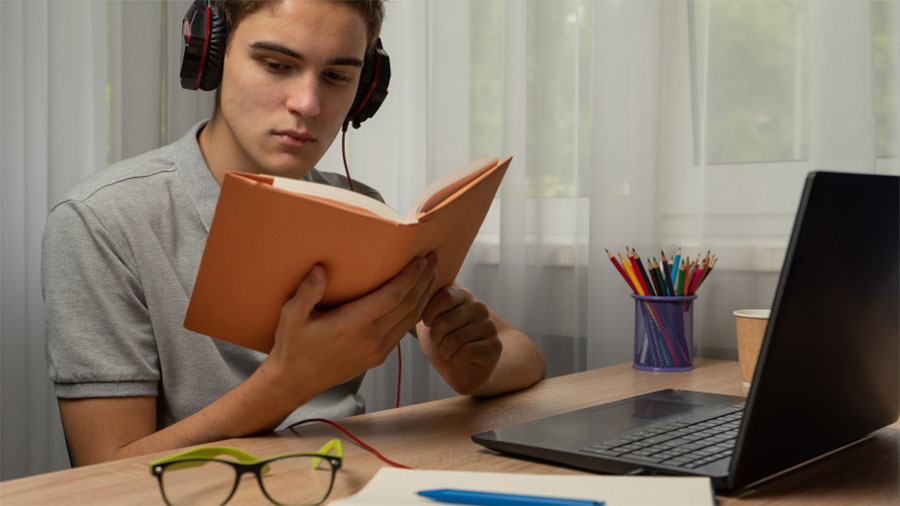As a result of the Covid pandemic, many school students throughout Australia are currently studying online. This can present challenges for young people’s learning and mental wellbeing, including having an inconsistent routine, increased distractions at home, limited social interaction with peers, as well as reduced one-on-one teacher support and feedback. This is particularly the case for high school students. In the last few months, arrangements for the Higher School Certificate (HSC) exams in NSW have been uncertain because of rising Covid case numbers. It is therefore entirely understandable that many high school students may be feeling overwhelmed, stressed and anxious. Common descriptions about remote learning I have heard from my teenage clients are that it is hard to get motivated, that they procrastinate a lot, that they find it hard to have a structure in their daily lives and that it’s easy to fall behind with the workload. There can also be greater stress placed on parents to assist their children’s learning.
Some simple but important tips for students to improve their mental health and maximise their productivity during remote learning include:
Effective study skills, time planning and organisation
- Set up a quiet study space that is free from all potential distractors. Organise study material, turn off mobile phones, hide social media, and eliminate all other distractors.
- Keep the same routine as if you were still attending classes in person. Whilst it might be tempting to sleep in or go to bed later, try and get up and go to bed at the same time as you normally would. Keep school hours just for that – get most of your schoolwork done during normal school time, don’t try and do things later at night.
- Use a diary and calendar to write down “to do” lists, i.e. a weekly plan of important study tasks for each subject. Prioritise the most important material to study as well as set realistic deadlines, rather than goals that are unattainable. Each achievement should be checked off and students may find that giving themselves small rewards leads to a sense of motivation and accomplishment.
- Use a calendar or planner to schedule days into “school time”, “study time” “relaxation/leisure time” and “social time” to ensure a healthy balance of activities.
- For assignments, start studying early and allow plenty of time to cover the material. Avoid cramming.
- Study in bursts and take short breaks every 45-60 minutes, whether this is going for a short stroll, making a cup of tea, grabbing a snack or listening to music for 5 minutes at a time.
- Setting goals can help keep you motivated and serve as a reminder for why you are studying.
- Avoid multitasking where possible, i.e. break tasks down into smaller, more manageable components and complete one task before moving on to the next.
- Practice good self-care. It is very important that students maintain a healthy diet, take frequent breaks to do something enjoyable, engage in regular physical exercise and social interactions, and ensure they get plenty of sleep.
Practicing mindfulness and relaxation techniques
Mindfulness practices are an effective way to reduce stress and anxiety. Currently, a range of mindfulness apps for young people are available, including “Headspace” and “Smiling Mind”. Similarly, practicing relaxation techniques, such as guided breathing exercises, progressive muscle relaxation, meditation and yoga may be helpful.
Challenge unhelpful thoughts and keep things in perspective
The way you think affects the way you feel and your actions. Unhelpful negative thoughts, or thinking errors, (e.g. “I am going to get really bad grades because of remote learning”) exacerbate anxiety and stress. You can benefit from identifying unhelpful thoughts and engaging in thought challenging. For example, “Do I know that this thought is true or do I just feel this?”; “If this thought was true, what is the worst thing that could happen?What are some of the ways that I could cope with that?”; “Is there another way I could look at this?”
Similarly, it is very important to keep things in perspective. We are all going through exceptionally difficult times and this is the especially the case for young people. Give yourself permission to be less hard on yourself given the current circumstances. Focus on what you can control, rather than what you can’t.
Identify when your mental health is suffering
Finally, seeking professional help is important if students start experiencing any of the following symptoms on a regular basis:
- Uncontrollable worries
- Mood difficulties (feeling irritable or depressed)
- Not enjoying or avoiding activities you would normally enjoy
- Changes in appetite (eating more or less)
- Trouble falling or staying asleep
- Fatigue or loss of energy
- Cognitive difficulties (problems with concentration, indecisiveness)
- Physical complaints (e.g. headaches, stomachaches, muscle tension)

